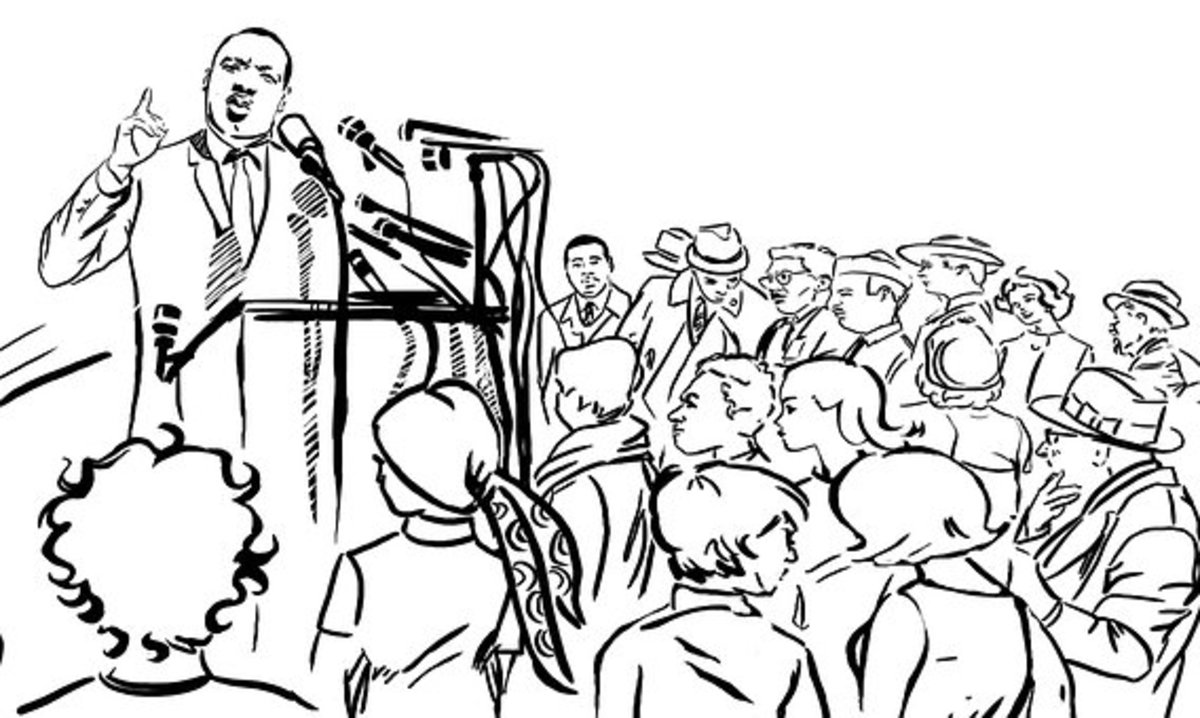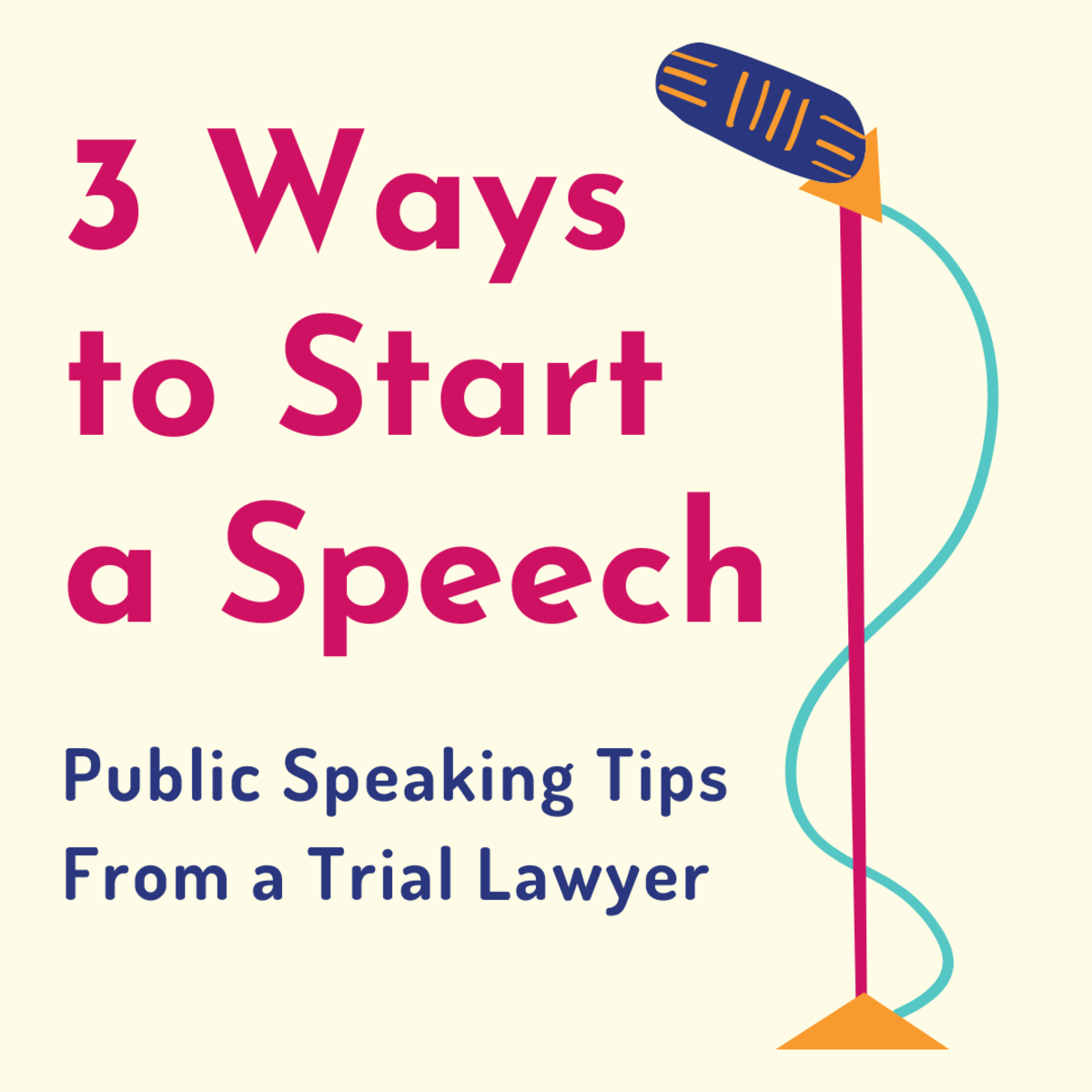Public Speaking Secrets Disclosed

Public Speaking; The Paralysing Fear
Public Speaking is a skill that many are weary of. The idea that one has to stand up in front of a crowd and speak on a given topic can be daunting even for the most confident of us. Many of us through sheer hard work and diligence have landed our dream jobs only to find ourselves held back by our lack of confidence in speaking confidently and sharing our ideas with others. Unfortunately our shyness is often mistaken for ignorance and we get sidelined in the organization.
New breakthrough in the domain of public speaking has taken the fear out of this dreaded task and propelled many a wallflower to achieve their dreams. If you simply follow the steps that I have laid out below, you should be able to optimize your success as a speaker whether in small groups or as a public speaker in seminars and give convincing presentations.
Here is how you too can be an amazing public speaker.

Aspect 1. The Mindset
You have to understand that the fear of speaking in public is normal and you are not alone. You have to acknowledge that you have a fear of speaking in public and you want to overcome it. Being in denial will only hinder your progress in acquiring these new skills.
Tell yourself that you can do this and that you want to acquire this skill. Work to get past this hurdle by practicing in small groups. We all speak all the time but in nonthreatening situations. We speak with family members, at work, with friends and even with strangers. Give your opinion when you are out with friends. Talk about various issues. Slowly get used to hearing your voice and having people looking at you when you are speaking. Many folks feel uncomfortable when people are looking at them. Practice and get past this. People are not staring at you, they are listening to you.
If your fear stems from your lack of confidence in speaking the language, work to overcome this problem. Listen to songs and sing along. Try Taylor Swift. Her lyrics are usually grammatically correct. Watch more movies and listen to the sentence structures used. Take up a new hobby where you can meet new groups of people who will not judge you. The Internet has opened the doors for many ‘group activities’. There are Book Clubs, Exercise Groups, Hobby Clubs and such where like-minded people form groups and share information. Join one of these groups. Practice your language skills on them. Trust me, they will not laugh at you.
One of the main setbacks of public speaking is the innate fear of being laughed at or derided by our friends. The reality of the situation is that the chance of this happening is very, very slim. In fact, your friends would laud your bravery and wish they had your guts.
Fear Is Normal
What Is Your Greatest Fear Of Speaking In Public?
Aspect 2. The Content
The fear of saying something stupid often holds an individual back from voicing their opinions. For starters, you can formulate your ideas in your mind before giving voice to them. Once again, work in small groups. Asking the opinions of others, would also allow you to speak without having to give long speeches. You can also memorise simple question sets to help you get started. For an example, asking another, “ What do you think about working overseas?” would push the focus away from you and yet allow you to participate in the conversation.
Once you begin gaining confidence you can be involved in longer sessions. Keep your sentence structure simple and avoid pronunciation pitfalls. This is a sure confidence booster in your quest to becoming a fantastic public speaker. When speaking in front of an audience, make sure you choose a topic that you are interested in. Do adequate research to ensure you how enough about the subject matter. Make sure you know your material thoroughly. In fact your knowledge must be beyond what is said in the speech. In this way even if you forget what you intend to say, you will not panic and be able to formulate a related sentence that makes sense. Based on this, another factor that you should take into count is the range of your content. Do not speak on too many issues. It is better to talk in depth about something specific rather that take a ‘touch and go’ approach. Furthermore, talking on a wide range of topics can tempt you to wander off and lose focus.
To be able to hold the attention of the audience you have to know the needs of your audience. The age and sex of the audience can be the determining factor. Are you speaking in front of a group of students or businessmen? Are they mainly males, females or a mixed group? You should match the contents of your speech to their needs. If your topic is not relevant to your audience, they may fidget, yawn, leave the hall or even fall asleep! You must be able to engage and captivate your audience. I am sure you know what your strong points are. Emphasize your strong points during your speech. Your subject matter, your voice and stage presence are all examples of different areas that will improve with practice.
The key to a successful presentation is speaking with conviction. Never speak on a topic that you don’t believe in. Your audience will latch on this easily. Even if you don’t totally agree with your content points, speak with conviction as if you really do. You must be able to persuade your audience to agree with your point of view. Organize your content into three main parts; The Introduction, The Body and finally, The Conclusion. The topic and the stand you are taking should be clearly stated in The Introduction. This will inform your audience and set their expectation. The Body is the main aspect of your speech. Here, your arguments should be organized one by one with supporting evidence or research to give strength and credibility to your speech. The Conclusion is the point where you restate your stand, summarize your points and tie you speech together. Each part is so important in creating a complete whole
You can imagine it this way; The Introduction is the box, The Body is its contents and The Conclusion is the ribbon tying everything beautifully together.
Aspect 3. Your Voice
A clear, strong voice is the greatest asset for a public speaker. Learn to use your voice to your advantage. Speak clearly. Do not mumble and do not speak too fast. The rate of speaking is important. For public speaking, your pace or rate of speaking should be slower when compared to normal speech. Although this might seem too slow for you, it will just fine for those who are listening. It is good to speak at a slower pace, with adequate pauses to allow time for the audience to really understand what you are saying. Remember, your audience does not have a written script to refer to, if they miss something that you are saying.
You also have to know the kind of impression you want to create. Are you trying to persuade? Are you trying to be assertive or is your intention just to inform. Very often your topic will determine the tone of your voice. Don’t’ sound querulous. To achieve the best results, master the art of breathing. Relax. Take deep breaths. This will calm you. Do not forget to also be aware of your pitch. Your pitch is vital. Make sure it is not too high. For beginners a lower pitch is better. A very high pitch can sound very whiny and annoying.
The ability to speak well in public also depends on one very important skill. The ability to articulate and pronounce words clearly and correctly. Your audience must be able to understand you. Go through your script or your cue card and identify words that you are not sure of. Use a dictionary or an e-dictionary to know exactly how to pronounce difficult words. Finally, keep practicing. There are no short cuts here. Go through your speech as many times as it takes to make you feel confortable. Practice using cue cards to help remember your key points. Practice speaking in a natural manner. Be at ease. Begin your speech by addressing the audience. Doing this can buy you time, adjust your pitch and calm your nerves. Pause and take a slow breath before beginning. Practice the pause points. Breathe naturally and you will slowly be able to relax. Remember, practice makes perfect.
In the issue of pauses and taking slow breaths, learn to use silence to your advantage. Take a moment to think before you speak. Silence, in between crucial ideas can create anticipation. Your listeners will be waiting for your next words eagerly.
How You Sound Is As Important To What You Say
You Could Be The Next Tony Robbins

Aspect 4. Paralanguage
These are the nonverbal cues that can make or break you as a speaker. The clothes you wear. The accessories we put on play a role in your success as a public speaker. Avoid flashy or party clothes. This will distract your listeners for the content of your speech. Long earrings and noisy bracelets also tend to take pull the listeners eyes towards these distractors. Wear clothes that can be termed as classy or elegant. Formal wear is the best as it creates a professional impression. Remember, you are like an actor on stage. Dress appropriately. Once again, your topic and your target audience will determine your demeanor. Hold your hands in front of you at waist level. Learn to be at ease. Don’t stand stiffly. It only shows that you are nervous. Use your hands to make subtle gestures to illustrate a point.
Learn to relax even if you are a mess on the insides. Go to the washroom. Make sure you have an early meal. These actions will help address your nervousness. When speaking, show suitable emotion and create rapport with your audience. Do not speak to the walls! Make eye contact with the audience. Show your sincerity. Focus on individuals; those in the front, the middle rows and the back rows. Have direct eye contact with a number of people sitting in different parts of the room. Occasionally, sweep your eyes over the whole room too when you are presenting your points. Your audience should be able to relate to what you are saying and feel involved. Even those at the back should also be able to relate to what you are saying.
Vary the tone of your voice and even add some humor if you are confident. This might help keep your audience interested and engaged. Remember, the success of your presentation will depend on the audience’s response and reaction towards it. Use feeling and gestures to intensify and stress a point. Don’t stand stiffly and read from your notes. Never ever carry long sheets of paper on stage. Use cue cards with topic sentences or trigger words on them to help you remember. Appropriate hand gestures or facial expression help to convey your sincerity. Reading from your notes forces you to look down and miss having eye contact with your audience. Remember you have to engage with your audience. Although at this juncture, I must remind you not to over do the emotions and gestures as it can distract your listeners from what you are saying.
Keep Your Dressing Simple

Aspect 5. Other Important Issues
In you presentation you are encourages to use relevant quotes, idioms and even proverbs. The problem here is that some speakers tend to over use the language forms and content is sacrificed. Make sure your quotes are relevant and don’t use them for the sake of using.
After your salutation, begin your speech with an interesting remark. Grab the attention of the listeners from the word “Go” and hold them there. Your last words before you take your seat, is just as important. End your speech with a thought-provoking remark. Leave your audience with a positive impression and a sense of completion. Don’t have a long and winding conclusion, leaving your listeners waiting for an end that does not seem to be happening. Leave your listeners with a positive impression and a sense of completion. Thank your audience and take your seat.
Filters
The use of filters can be distracting and create an impression that you lack the skills to speak in public. We often use filter words in everyday speech but this should be avoided in formal speeches at all cost. Well, what are filter words? These are words that actually do not serve any purpose and can become distractors when your listeners are trying to focus and understand your message.
Sample of filter words are “um”, “you know”, “er”, “well”, “you know” and “so”. It creates an impression that you are not prepared and are using these filters as delay tactics while you try to remember your lines. The good news here is that the use of filters in public speaking can be eliminated through diligence.
Before, you learn to stop using these unnecessary filters you should understand why you use them in the first place and the rudiments of what is really happening. Some of us have been conditioned to speak quickly and avoid pockets of silence. Thus, we tend to us these filters to create the impression that we have not gone ‘blank’ or stopped completely. The first thing, that you should realize is that silence is permissible and is acceptable. You don’t have to verbalize anything when you are thinking. When we use filter words, we are actually thinking and these little sounds or words we use are the result of this process. In other words, you are actually verbalizing your thought process. To get rid of this habit you would hence, have to learn to replace your filters with short pauses. In other words:
Filter, Think and Speak now needs to be changed to Pause, Think and Speak.
Once you are aware what you are doing and why you are using these filters, you can easily condition yourself to stop using them. Take a few seconds to think, formulate your ideas and then verbalize it. This will help you avoid using filter words and help you organize your ideas before speaking. It will also give you better control of your ideas and make you a powerful speaker. You will begin to look more prepared and self-assured; both traits of an competent speaker. The trick here is to keep practicing. Every time you speak, be aware of your tendency to use filters. Tell yourself, “Stop it’. Do it consciously and soon you will be able to speak without these filters.
Assumptions
Never assume that you are failing or that your speech is weak just because your listeners are not smiling or nodding their heads in agreement. It is quite normal for people to keep a stern face and not display any modes of encouragement while speaking. In fact, you only might get an indication of how you fared only at the end of your speech based on the level of applause.
On The Day Of The Event
Make sure you are aware where the event is going to be held. Arrive early. You don’t want to be caught in unexpected traffic or weather.
Do you need specific equipment? As soon as the hall has been set, check the equipment. Note the type of microphones used, the lighting in the room and if there is a rostrum (if you need one).
Focus on the stage. Will you be expected to be on the stage on the same level with the listeners? You have to decide where you will place yourself when giving your speech.
Check this in relation to the lighting. Make sure you are not standing in the shadows and that you can be seen by everyone in the hall.
As the crowd begins to arrive, mingle with them. This will help you relax and engage with your audience once you begin to speak. If you have a unique name, locate the master of ceremony and check on how you are going to be introduced. Trust me, they will appreciate your help and you could avoid a very embarrassing situation.
When you are done with your speech, look at your audience, smile and leave the stage. Walk out at a natural pace. Do not run off and give the impression that you are running away. Keep your chin up and walk all the way back to your seat.
Good luck. I know you can do this.
Public Speaking Skills Can Be Mastered

- How To Make Money By Becoming An Effective Speaker
Speakers are highly in demand and these guidelines will help you become an excellent speaker and trainer








